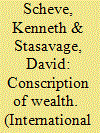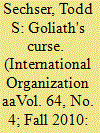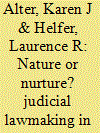|
|
|
Sort Order |
|
|
|
Items / Page
|
|
|
|
|
|
|
| Srl | Item |
| 1 |
ID:
099869


|
|
|
|
|
| Publication |
2010.
|
| Summary/Abstract |
The dominant narrative of the politics of redistribution in political science and economics highlights the signature role of the rise of electoral democracy and the development of political parties that mobilize working-class groups. We argue in this article that this narrative ignores the critical role played by mass warfare in the development of redistributive public policies. Focusing attention on the determinants of progressive taxation, we argue that mobilization for mass warfare led to demands for increased taxation of the wealthy to more fairly distribute the burden for the war effort. We then show empirically that during the past century, mass mobilization for war has been associated with a notable increase in tax progressivity. In the absence of war, neither the establishment of universal suffrage, nor the arrival of political control by parties of the left is systematically associated with large increases in tax progressivity. In making these arguments, we devote particular attention to a "difference-in-differences" comparison of participants and nonparticipants in World War I.
|
|
|
|
|
|
|
|
|
|
|
|
|
|
|
|
| 2 |
ID:
099875


|
|
|
|
|
| Publication |
2010.
|
| Summary/Abstract |
States typically issue compellent threats against considerably weaker adversaries, yet their threats often fail. Why? Expanding on a standard model of international crisis bargaining, I argue that a theory of reputation-building can help shed light on this puzzle. The model casts reputation as a strategic problem, showing that challengers issuing compellent threats have incentives to anticipate the reputation costs that target states incur when appeasing aggressors. If challengers can recognize these costs and offset them with side payments or smaller demands, then even reputation-conscious targets will acquiesce. I argue, however, that military strength contributes to information problems that make challengers more likely to underestimate their targets' reputation costs and insufficiently compensate them. In this way, military power can undermine the effectiveness of compellent threats. The logic is illustrated by the 1939 Russo-Finnish crisis, and the argument's implications for the study of coercive diplomacy are explored.
|
|
|
|
|
|
|
|
|
|
|
|
|
|
|
|
| 3 |
ID:
099871


|
|
|
|
|
| Publication |
2010.
|
| Summary/Abstract |
Are international courts power-seeking by nature, expanding the reach and scope of international rules and the courts' authority where permissive conditions allow? Or, does expansionist lawmaking require special nurturing? We investigate the relative influences of nature versus nurture by comparing expansionist lawmaking in the European Court of Justice (ECJ) and the Andean Tribunal of Justice (ATJ), the ECJ's jurisdictional cousin and the third most active international court. We argue that international judges are more likely to become expansionist lawmakers where they are supported by substate interlocutors and compliance constituencies, including government officials, advocacy networks, national judges, and administrative agencies. This comparison of two structurally identical international courts calls into question prevailing explanations of ECJ lawmaking, and it suggests that prevailing scholarship puts too much emphasis on the self-interested power-seeking of judges, the importance of institutional design features, and the preferences of governments to explain lawmaking by international courts.
|
|
|
|
|
|
|
|
|
|
|
|
|
|
|
|
| 4 |
ID:
099876


|
|
|
|
|
| Publication |
2010.
|
| Summary/Abstract |
Oil-exporting states, or petrostates, engage in militarized interstate disputes (MIDs) at a much higher rate on average than nonpetrostates. Why is this so? Further, what explains the variation among the petrostates in adopting aggressive foreign policies and engaging in MIDs on that basis? This article develops a theory that proposes that revolutionary petrostates have a higher propensity to launch MIDs than comparable nonpetrostates. This theory is tested with statistical analysis using a new quantitative data set that identifies revolutionary governments in the period 1945-2001. The results show that petro-revolutionary governments constitute a special threat to international peace and security. This evidence of resource-backed aggression challenges the conventional view of petrostates as the targets of international competition for resources.
|
|
|
|
|
|
|
|
|
|
|
|
|
|
|
|
| 5 |
ID:
099873


|
|
|
|
|
| Publication |
2010.
|
| Summary/Abstract |
Scholars have found an association between membership in regional intergovernmental organizations (IGOs) and democracy, and IGO enforcement is often credited as an important factor explaining this link. But empirical evidence reveals great variation in whether these organizations actually respond to violations of democratic norms, even in democratic regions. Why do IGOs punish some norm-violating countries but not others? What does this variation imply for theories about how IGO membership helps states make credible commitments? This article presents a theoretical framework for understanding variation in multilateral norm enforcement. It identifies two obstacles to enforcement-the presence of competing geopolitical interests and uncertainty about the nature and scope of norm violations-and it argues that international monitoring can help mitigate these obstacles by revealing and publicizing information that pressures reluctant member states to support enforcement. An original data set of democracy enforcement in Latin America and postcommunist countries is used to examine regional IGO enforcement in response to one prevalent type of democratic norm violation: electoral misconduct. I find that enforcement is less likely in countries of high geopolitical importance, but the presence of election observers increases the probability of enforcement, and the content of observers' reports influences the type of enforcement that is imposed. These findings suggest that the link between IGO membership, credible commitments, and democracy should be theorized and tested as a conditional relationship, depending on country- and incident-specific factors that influence the likelihood of enforcement.
|
|
|
|
|
|
|
|
|
|
|
|
|
|
|
|
|
|
|
|
|